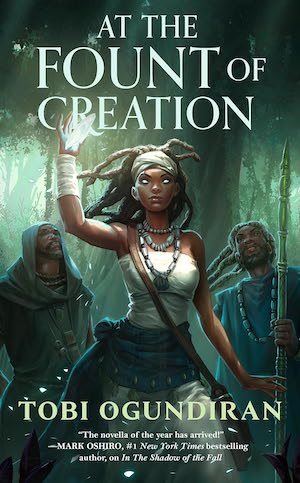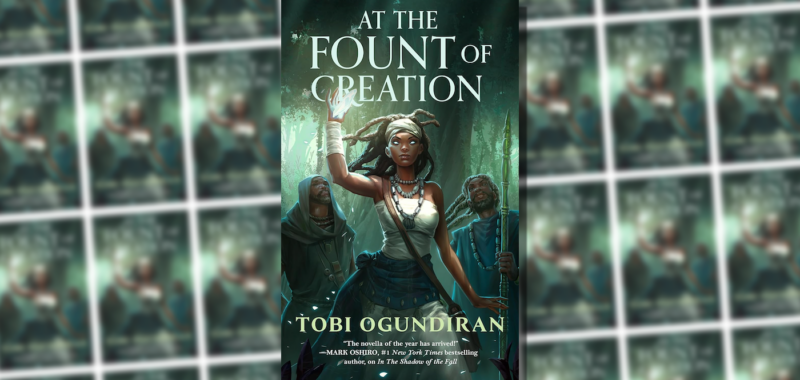Can a fantasy series be too epic? There’s a long history of SFF series that take longer to complete than their author anticipated. Douglas Adams’s Mostly Harmless was billed as “The fifth book in the increasingly inaccurately named Hitchhikers Trilogy.” George R.R. Martin’s A Song of Ice and Fire has, famously, taken longer to complete than its author anticipated. And Robert Jordan died before completing his massive The Wheel of Time.
This is not a problem for Tobi Ogundiran, whose Guardians of the Gods duology comes to its conclusion with At the Fount of Creation. Without spoiling too much, while this duology certainly leaves its author with plenty of options should he want to revisit its setting, it also tells a thoroughly complete story in and of itself, one that has a mythic heft, a chosen one, and a fundamental shift in its fantasy world’s status quo.
In this book’s predecessor, In the Shadow of the Fall, Obigundiran introduced readers to Ashâke, a young woman raised in a religious sect who discovers that much of what she’d believed about her origin was false. The society in which she lives is at risk from both a god-killing entity and a body-jumping being working to upend the status quo, leaving death in their wake. At the end of the first volume, Ashâke learned that she is—as the duology’s title suggests—tasked with keeping the orisha that govern her world safe, and that this arrangement connects her to an uncanny source of power.
At the Fount of Creation does feel a bit more open, narratively speaking, than its predecessor. For one thing, Ogundiran gives a sense here of the passage of time, which in turn gives a greater narrative weight to things. Understanding that this is playing out over a scale of months and years deepens our understanding of how this world works, and adds to the scale of things as well. Every time a character (or the narrator) referred to the number of “moons” that had passed, the overall scale of the book (and the series) felt more established.
But even as At the Fount of Creation has a grander scale than its predecessor, there are a few narrative beats within that might have been more effective if they could have played out over a longer number of pages. One has to do with Djábri, who’s initially posited as a foe to Ashâke but eventually becomes allied with her cause. To go into another example would risk spoiling much of the second half of the book, but it concerns the antagonist of this novel (and the series as a whole) and doesn’t land with as much of an impact as it might have over a longer number of pages.
Buy the Book


At the Fount of Creation
At the Fount of Creation does provide context for certain elements of the first book, including revealing more about the origin of the man known as the Teacher, such as the roots of his power and the reason he seeks revenge on the orisha. While he’s the antagonist of this book, and while his disciples have committed atrocities in his name, Ogundiran doesn’t portray him as a mustache-twirling villain. Instead, the author gives the reader a sense of the larger ethical questions that the Teacher reckoned with early on, and the ways in which power has affected both him and the orisha whose destruction he seeks.
Those ethical questions manifest in other ways. Early in the novel, Ashâke encounters a friendly face in Simbi, who turns out to be working with Ashâke’s enemies to keep her own family safe. Ashâke’s own musings on this don’t shy away from the complexity of the issue:
Simbi had betrayed her, given her up to save her family. And though it hurt to think about it, Ashâke understood. They were friends… had been friends, but blood ran thicker than water. What would it say about Simbi if she readily turned her back on her husband and children, if she abandoned them to help her?
That internal debate helps set the groundwork for other, larger moral questions still to come. And, without giving too much away, it also helps turn Ashâke’s isolation from different factions in her world from a source of tension into an asset, giving her a greater sense of distance and enabling her to make some difficult and weighty decisions. Guardian can mean “protector,” after all, but that isn’t the only way to interpret it—and by novel’s end, just what Ogundiran means by “Guardians of the Gods” turns out to be more complicated than it might have seemed.
Another memorable quality of At the Fount of Creation comes as Ashâke—and, through her, the reader—discovers more about the way the orisha govern and shape the world. At one point, she learns about a time the trickster Eshu was trapped inside of a tree, a punishment that began to have repercussions in the wider world:
Without Eshu there to control them, the roads began to…come undone. You could set out from your village to another village, a perfectly straight path, and end up lost in the desert, or the jungle. Mortals cried and petitioned. Eshu’s priests spent their lives praying to him, but of course he couldn’t respond.
At the Fount of Creation raises another big question about its very structure: Do the orisha even merit being guarded? Read enough stories of gods, no matter what their pantheon may be, and you’ll inevitably find stories of them disrupting the lives of mortals. Early in this novel, the Teacher asks the question, “What is the point of a god?” And in a series of interludes that fill in an important character’s history, we see a man then known as Yinka appeal to the orisha for the life of his daughter, only to be scorned by one and manipulated by another.
The two relatively slim volumes of this duology contain an epic trilogy’s worth of backstory, doublecrosses, and shifts in allegiance. And, as mentioned earlier in this review, Ogundiran certainly leaves himself some opportunities to return to this world and these characters in the future, even as he brings this particular series to an unambiguous conclusion. There’s a lot to like about that—leaving an audience wanting more is generally a better way to go than saturating them with lore for the sake of lore.
At the Fount of Creation is published by Tordotcom Publishing.

